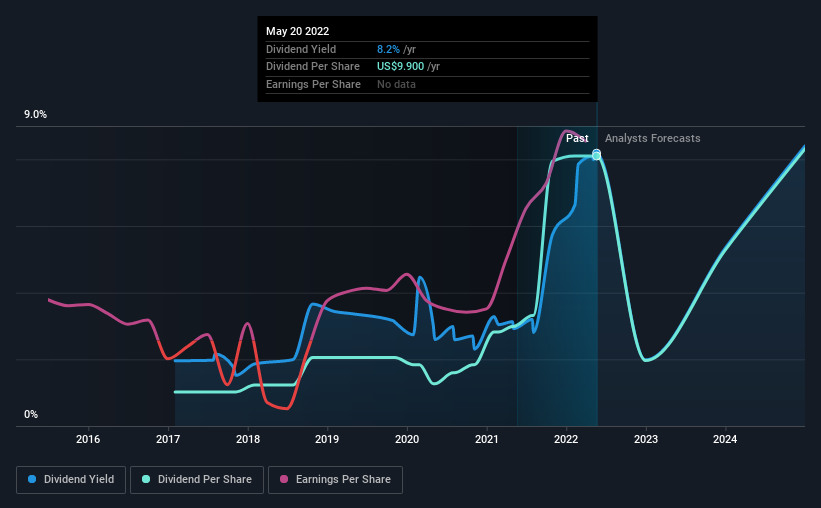Piper Sandler Companies (NYSE:PIPR) Passed Our Checks, And It's About To Pay A US$0.60 Dividend
Piper Sandler Companies (NYSE:PIPR) stock is about to trade ex-dividend in 4 days. Typically, the ex-dividend date is one business day before the record date which is the date on which a company determines the shareholders eligible to receive a dividend. The ex-dividend date is important as the process of settlement involves two full business days. So if you miss that date, you would not show up on the company's books on the record date. This means that investors who purchase Piper Sandler Companies' shares on or after the 26th of May will not receive the dividend, which will be paid on the 10th of June.
The company's next dividend payment will be US$0.60 per share. Last year, in total, the company distributed US$9.90 to shareholders. Based on the last year's worth of payments, Piper Sandler Companies stock has a trailing yield of around 8.2% on the current share price of $120.96. If you buy this business for its dividend, you should have an idea of whether Piper Sandler Companies's dividend is reliable and sustainable. We need to see whether the dividend is covered by earnings and if it's growing.
Check out our latest analysis for Piper Sandler Companies
Dividends are usually paid out of company profits, so if a company pays out more than it earned then its dividend is usually at greater risk of being cut. Piper Sandler Companies is paying out just 12% of its profit after tax, which is comfortably low and leaves plenty of breathing room in the case of adverse events.
Generally speaking, the lower a company's payout ratios, the more resilient its dividend usually is.
Click here to see the company's payout ratio, plus analyst estimates of its future dividends.
Have Earnings And Dividends Been Growing?
Stocks in companies that generate sustainable earnings growth often make the best dividend prospects, as it is easier to lift the dividend when earnings are rising. Investors love dividends, so if earnings fall and the dividend is reduced, expect a stock to be sold off heavily at the same time. That's why it's comforting to see Piper Sandler Companies's earnings have been skyrocketing, up 62% per annum for the past five years.
The main way most investors will assess a company's dividend prospects is by checking the historical rate of dividend growth. Piper Sandler Companies has delivered an average of 51% per year annual increase in its dividend, based on the past five years of dividend payments. Both per-share earnings and dividends have both been growing rapidly in recent times, which is great to see.
The Bottom Line
Is Piper Sandler Companies an attractive dividend stock, or better left on the shelf? When companies are growing rapidly and retaining a majority of the profits within the business, it's usually a sign that reinvesting earnings creates more value than paying dividends to shareholders. This is one of the most attractive investment combinations under this analysis, as it can create substantial value for investors over the long run. We think this is a pretty attractive combination, and would be interested in investigating Piper Sandler Companies more closely.
With that in mind, a critical part of thorough stock research is being aware of any risks that stock currently faces. For example - Piper Sandler Companies has 3 warning signs we think you should be aware of.
If you're in the market for strong dividend payers, we recommend checking our selection of top dividend stocks.
Have feedback on this article? Concerned about the content? Get in touch with us directly. Alternatively, email editorial-team (at) simplywallst.com.
This article by Simply Wall St is general in nature. We provide commentary based on historical data and analyst forecasts only using an unbiased methodology and our articles are not intended to be financial advice. It does not constitute a recommendation to buy or sell any stock, and does not take account of your objectives, or your financial situation. We aim to bring you long-term focused analysis driven by fundamental data. Note that our analysis may not factor in the latest price-sensitive company announcements or qualitative material. Simply Wall St has no position in any stocks mentioned.

 Yahoo Movies
Yahoo Movies 

